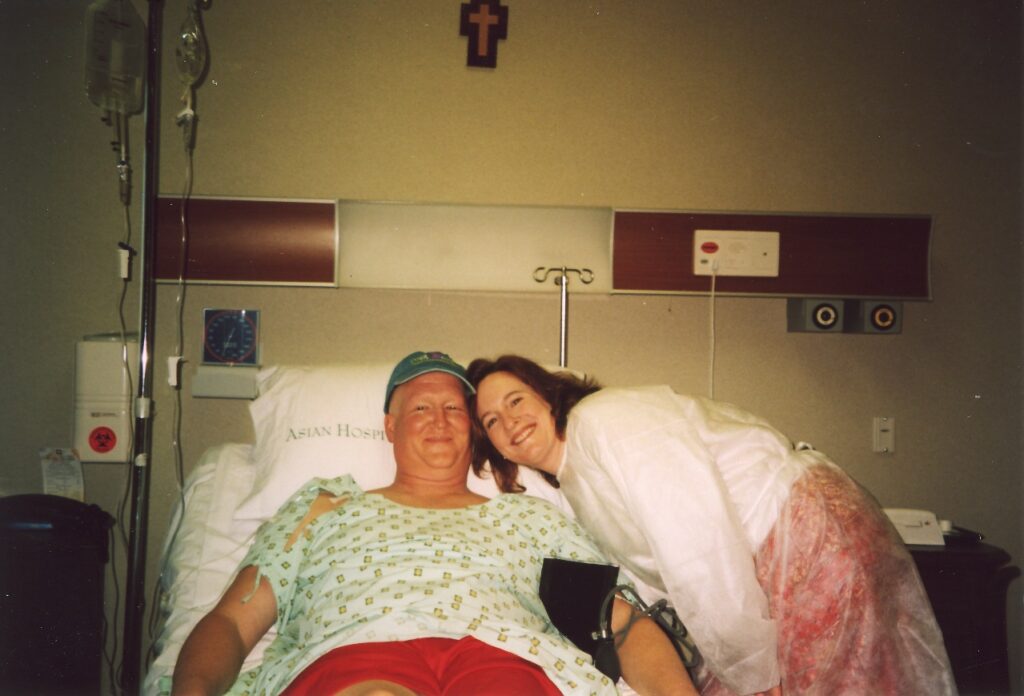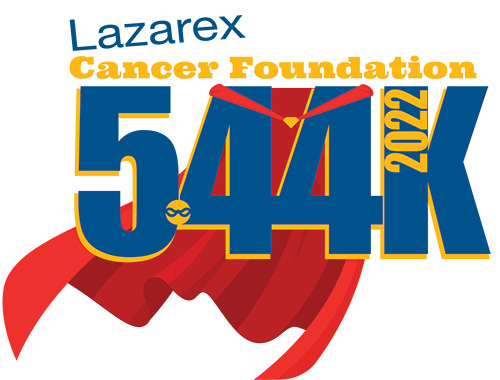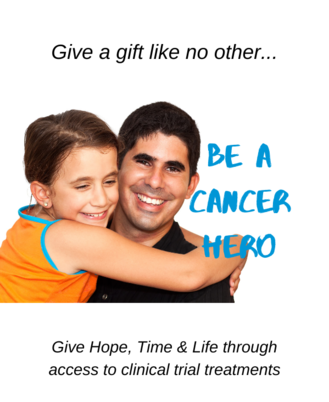Given my experience – and empathy for all the caregivers out there – I want to offer some tips on this National Caregivers Day to focus on your health as you help a loved one with theirs.
By Erin Miller, Development Manger, Lazarex Cancer Foundation
Everyone with cancer and their loved ones share a common bond in that they have all experienced a “C-Day”, the day they were diagnosed with cancer. There are no words to describe the paradigm shift that takes place at that very moment. You go from having hopes and dreams for the future to simply trying to survive each day. You need help and a support system because this is “the hard stuff” on every level. I look back at my journey with my late husband Mike and I am now (19 years later) so incredibly grateful for every moment I spent with him during his journey. I can smile or laugh at many of the things that made me cry back then because I now have the perspective to do so.

No one, and I mean no one, at 35-years-old envisions having to sponge bathe their spouse, or hold a bed pan for them and clean them up or remove hundreds of staples from their midsection. These things are all very traumatic for everyone involved. I can remember crying daily but hiding it from Mike because I was terrified not just for Mike’s future but for mine and my three young children. I felt like I had to be strong for him and everyone else. Given my experience – and empathy for all the caregivers out there – I want to offer some tips on this National Caregivers Day to focus on your health as you help a loved one with theirs.
FIND A SUPPORT SYSTEM
Fortunately, I had a great support system. My mother-in-law, Bonnie, moved in with us and was an amazing source of daily support. We did this together and formed a bond that will last forever. Whether it is a person or a support group, know that you can’t do this alone. You need a support system. In fact, you deserve it.
ACKNOWLEDGE THE NEW NORMAL
Your past reality is now a fantasy. You cannot keep everything “normal.” There is nothing normal about it. Don’t hurt yourself trying to. Give yourself a break. When people say “please let me know what I can do for you”… do it!! Can you please pick my kids up from school? My yard is growing out of control, would you mind mowing it for me? Can you please walk my dog while I am at treatment all day? People truly want to help, and you are giving them a gift by allowing them the opportunity to make a difference in some way. It takes a village!
SET YOUR OWN BOUNDARIES
Control becomes an issue for many patients. Their lives are careening out of control, and they need to find it somewhere. This is where boundaries come in. You need to have some. I did not. It was bad. Bonnie and I did rock, paper, scissors, every day to see who would cook Mike’s eggs. They couldn’t be too loose, or too dry and there was a fine line that was acceptable, or he would literally throw them across the room. He was a bear when it came to the stinking eggs because it was his cry for control. Create some boundaries for yourself and don’t feel guilty for having them. You need to allow yourself the time to process your feelings daily. Again…support groups or some sort of therapy is key.
DO THE HARD WORK OF PREPARING FOR THE FUTURE

One of the hardest things about the cancer journey is that it shines a spotlight on the fragility of life. We need to address all of the things that we would prefer to put off such as creating advanced directives and a will. They aren’t kidding when they say, “get your affairs in order”. (BTW… I hate those words.) This is a difficult process in the best of times but when staring down the possibility of having to use them sooner rather than later it takes on a whole different, serious, and morose feeling. The truth is that doing this hard work pays off in spades with the comfort of understanding what your loved one wants for themselves before the going gets too tough. It removes much of the guilt and decision-making pressure that would otherwise require more therapy.
RECOGNIZE THAT YOUR LOVED ONE NEEDS CONTROL
One thing that I found particularly difficult is accepting the decisions of those we care for when we don’t agree with them. We must remember that we are going along on this journey and sometimes we need to allow our loved ones to make decisions that we don’t agree with. Not only do we have to accept them but oftentimes we have to honor them for our loved ones when they can’t.
GO EASY ON YOURSELF
Being a caregiver is not something that we choose. It chooses us. It’s often a thankless job that is painful, scary, and exhausting. You need to practice self-care and be real with your feelings. Cry, scream, pray… whatever you need to do to honor your feelings. Take a few hours to do something you enjoy and ask someone to come stay with your partner, so you aren’t worried the whole time. Be honest with your support system and honest with yourself. Whatever the result is, when you look in the rear-view mirror, you will be grateful that you were there and that you spent the time to make a difference.
Here are some trusted and amazing resources that can help you on your caregiver journey:
Imerman Angels- Imerman Angels provides FREE personalized one-on-one cancer support for cancer fighters, survivors and caregivers.
Nancy’s List – Nancy’s List – No one will ever go through cancer alone (nancyslist.org) A beautifully compiled list of resources for all the amazing cancer patients everywhere and for those who love and care for them.
Lazarex Cancer Foundation – Lazarex Cancer Foundation | Clinical Trials Access for Patients through clinical trial navigation and travel expense reimbursement to get patients to their clinical trial treatments for renewed hope and a chance at life.

About the Author: After graduating from Florida State University and working as a marketing rep for several years, Erin married Michael Miller and the following year they had the first of three children. In May 2003, Mike was diagnosed with stage IV, non-resectable pancreatic cancer. It was the difficult and painful journey to save Mike’s life that led them to a search for a clinical trial while undergoing traditional cancer therapy. Mike’s participation in the clinical trial resulted in 19 months of life instead of the prognosis of five months. In 2006, Lazarex Cancer Foundation was founded by Erin’s sister, Dana Dornsife, in Mike’s memory.
Erin moved across the country to CA to work with her sisters at Lazarex in 2017. Lazarex has been a blessing to her and her family as a way to help people whose lives have been ravaged by cancer. As the Development Manager she uses her experience and passion to raise money to reimburse patient expenses so they can travel to potentially lifesaving clinical trial treatments. She is honored to be part of a movement that will sustainably transform the cancer realm and help create equitable access to cancer resources, care, and clinical trials for thousands of patients in need with a focus on improving access and health outcomes for communities of color and those who are most at risk.




